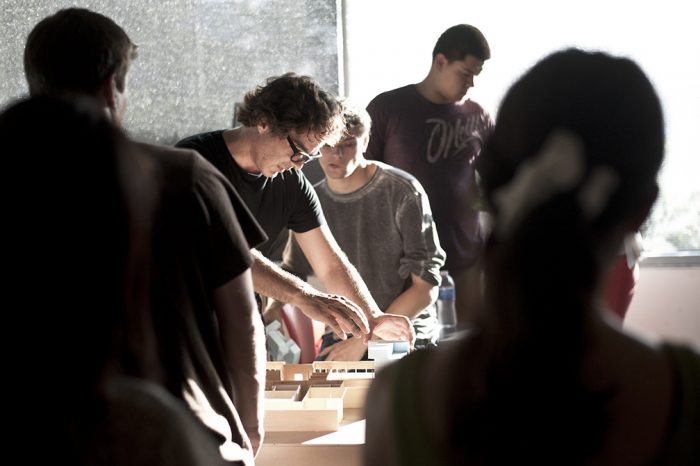Faculty Spotlight: Marcel Sanchez-Prieto
Marcel Sanchez-Prieto is a Professor of Architecture at Woodbury and co-founder of CRO Studio, a collaborative practice established at the border region of Tijuana and San Diego. CRO Studio focuses on urban renewal through architecture and research, including the development of design methodologies that expand geometry as a tool for urban sensing, architectural innovation through the incorporation of civic values and the potential of opportunistic landscapes. We caught up with Marcel and asked about his experiences in academia and the profession.
Interview with Marcel Sanchez-Prieto

What do you enjoy most about teaching at Woodbury?
To be part of a community that genuinely believes in advancing the discipline of architecture, making meaningful contributions to students and our community. Woodbury is very unique in having two different campuses, while I work in San Diego, I am also part of the Los Angeles campus; this opens a range of opportunities and challenges that helps to put into perspective our work within the larger Southern California context, while positioned at a highly controversial border condition. It is an exceptionally collegiate environment across very talented faculty, students and staff, making this an important platform to learn and contribute to our region.
What classes do you teach and which is your favorite? Why?
My favorite part of teaching is being in the process of an evolving course. I use the classroom as a laboratory, an evolution and cross-pollination of previous classes I have taught and courses that my peers are teaching. It is always exciting for me to think what we will be discovering at the time. Although I have been teaching studios and seminars at different levels, they commonly frame around current challenges of our immediate environment: sustainable revitalization of city neighborhoods, emergent growth on urban peripheries, resurgence of civic space, migrant populations and the impact of industry and new material technologies. Teaching is a fertile ground for testing ideas and the different classes that I have been part bring a great range of angles to see these topics through.
What do you consider to be your greatest accomplishment, personally or professionally?
While we have been very fortunate to receive several awards in our practice, such as the BIAU Awards – IX Latin American Biennial of Architecture and Urbanism – one of the most coveted awards in Latin America, the greatest achievement and enjoyment has been in the opportunity to share our interests to a greater community that will shape and build our future communities.
What would you say to a prospective student who is considering Woodbury University?
To take risks, experiment, discover and to expect the same from your professors; this is what makes a true laboratory spirit which moves beyond the limits of the traditional hierarchical classroom. Consider education as not only to acquire tools, but think of them as being robust enough that adapts to the changing needs of the profession and its future endeavors. To cherish the sense of community that stimulates self-reliance among students, be veracious, be informed and alter the conventional way of understanding our built environment. Finally don’t forget to have fun while you are doing it!
How has your academic or professional experiences shaped your teaching?
Both practice and teaching have been interdependent, so it’s very challenging to see it separately. With my partner Adriana Cuellar, we established our practice CRO studio since our return in 2007 from Rome. We have been very fortunate to participate in many projects in the region: from collaborations with communities, the government, nonprofit organizations and religious institutions, we have had the great opportunity to work on projects with a strong social impact agenda. Architecture of social interests has been the base of our practice, while at the same time, my teachings at Woodbury San Diego since 2007 has fundamentally focused on collaborating with students and faculty in developing pedagogic processes and design methodologies. Teaching as collaborative research has been the academic platform, where both professional and academic experience have constantly been informing each other. The success of the projects is the success of our students and faculty, we are very grateful to the Woodbury community.
What would you hope students take away from your classes?
A sense of curiosity and inquiry, that design is more active by involving a process of discovery than pre-established directions; that they are part of a collective discipline and that learning is to ask, to see and to elaborate. Architecture is a constant learning through experience and an evolving sensibility to observe.
Describe your approach to teaching in 3 words.
collaboration, curiosity, inquiry